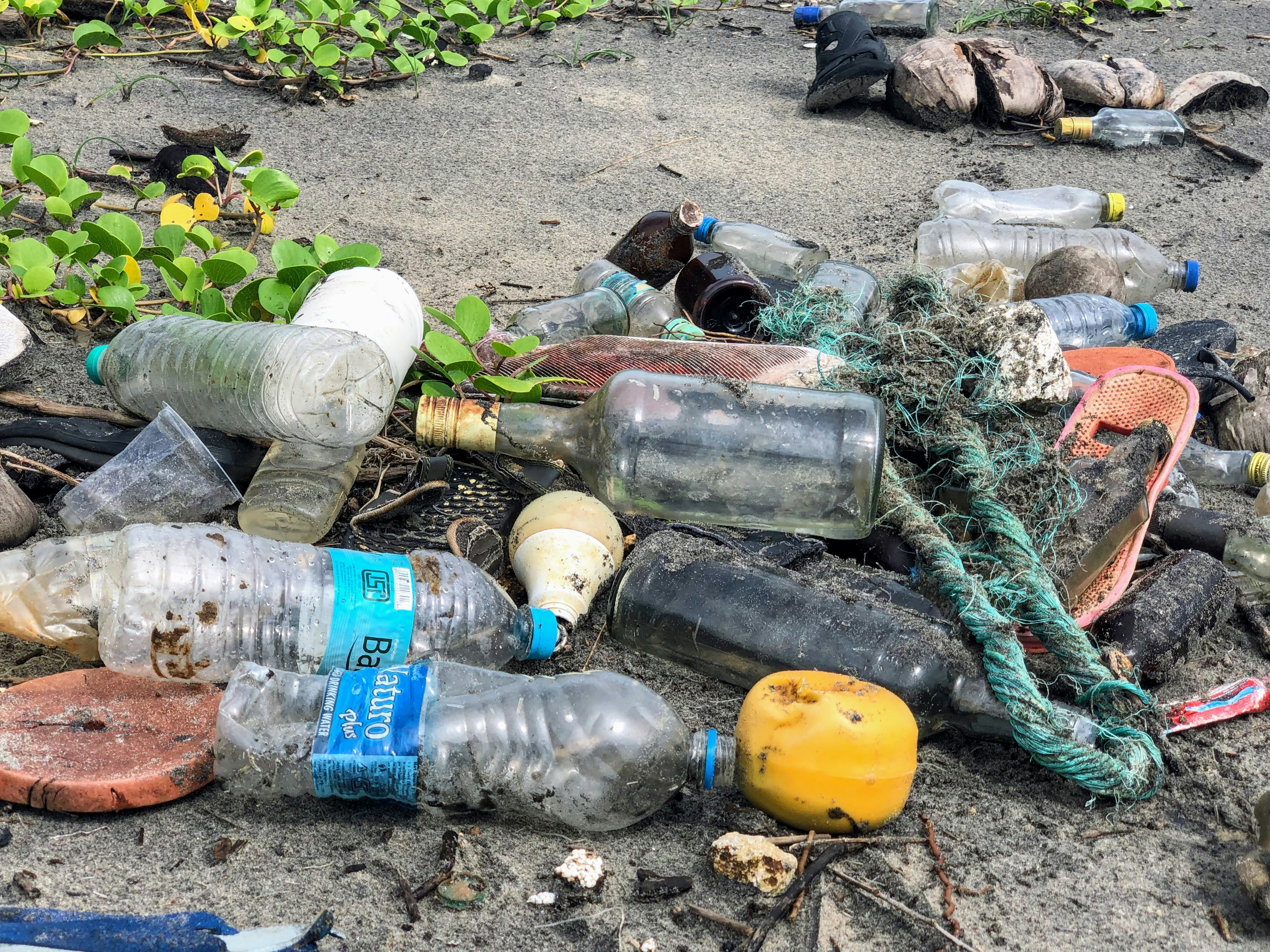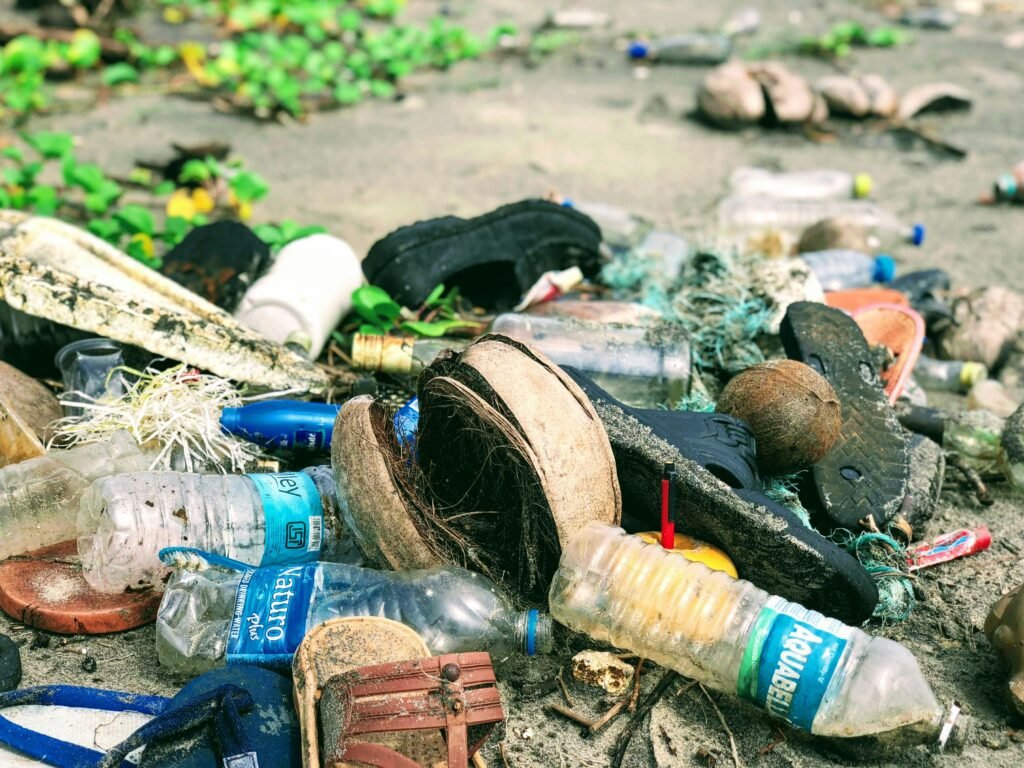Environmental Sciences and Solid Waste Management: A Strong Ecological Approach
February 10, 2025 | by gohar.ayub714@gmail.com
 Photo by John Cameron on Unsplash
Photo by John Cameron on Unsplash Introduction
Most important for environmental sustainability is solid waste management (SWM). With rapid urbanization, population growth, and industrial development, garbage generation has skyrocketed everywhere. Poor waste management drives pollution, climate change, and health hazards. Including concepts from environmental science, however, will help us to develop practical solutions for reusing, recycling, trash reduction, and reducing environmental effects.

This blog looks at the need for solid waste management, its challenges, modern solutions, and the contribution environmental science makes to creating a sustainable waste management system.
Understanding solid waste management
Solid waste management is the gathering, movement, treatment, recycling, and disposal of waste products. It seeks to maximize resource recovery while lessening waste’s effects on the environment and human health.
Usually, solid waste falls into:
Including plastics, paper, food trash, and textiles, municipal solid waste (MSW) is household and commercial waste.
Industrial waste is the result of manufacturing operations, including byproducts and toxic chemicals.
Biomedical waste, which includes infectious items, originates from labs, clinics, and hospitals.
Agricultural waste refers to organic materials, including animal dung and crop waste.

E-waste refers to discarded electronic goods such as batteries, computers, and cell phones.
Effective waste management is essential for preventing environmental damage and advancing a circular economy, which recycles and reuses materials.
The Environmental Effects of Inadequate Waste Management
Improper garbage management and disposal speed up environmental damage, leading to
1. Ground and Water Contamination
Lead, mercury, and microplastics from trash dumped in landfills poison soil and groundwater. As trash breaks down, leachate—a liquid—seeps into the ground and rivers, damaging aquatic habitats.
2. Emissions of greenhouse gases and air pollution.
Open-burning trash generates dangerous pollutants, including particulate matter, furans, and dioxins that aggravate respiratory problems. Organic waste breaks down in landfills, releasing methane, a powerful greenhouse gas driving change in the temperature.
3. Challenges to marine ecosystems and wildlife
Particularly single-use plastics and plastic trash threaten aquatic life. Many times, animals eat plastic garbage, which causes entanglement or starvation. Additionally, entering the food chain and influencing human health are microplastics found in oceans.
4. Issues about public health
Improper disposal of biomedical and industrial waste spreads infections, contaminates food and water supplies, and increases the risk of respiratory problems due to air pollution.

Contemporary Solid Waste Management Strategies
Governments, businesses, and researchers are using creative and sustainable solutions to fight trash pollution.
Reducing, reusing, recycling, recovering, and refusing
- the five R approaches
Choose sustainable items and lower usage to help minimize waste creation.
Reusing materials and repurposing objects will help extend the lifespan of products.
Recycling trash into new products helps to save resources.
Waste-to-energy (WTE) technologies help you recover useful energy from trash.
Steer clear of non-biodegradable products and single-use plastics. - WTE Technologies: Waste-to-Energy
Turning garbage into energy creates electricity and lessens reliance on landfills. Techniques involve:
Burning rubbish to generate electricity is known as incineration.
Anaerobic digestion breaks down organic waste to create biogas.
Pyrolysis and high-temperature breakdowns of garbage generate syngas and bio-oil. - Waste management, including biodegradable composting.
Compost organic waste—including agricultural residue and meal leftovers—into nutrient-dense soil enhancers. Reducing waste and ill waste emissions by supporting sustainable agriculture, and composting help. - Integrated AI and Smart Waste Management
Waste management technologies enhance efficiency by:
IoT-enabled smart bins that alert authorities when full
AI-based garbage sorting technologies automatically help simplify recycling.
Blockchain for Waste Tracking: Improving waste management practices using openness. - Extended Producer Liability (EPR)
EPR rules let producers answer for the end-of-life disposal of their products. Businesses are urged to create environmentally friendly packaging and carry out recycling initiatives. - Circular Economy Projects
A circular economy emphasizes keeping materials in use for as long as feasible rather than the conventional “take, make, dispose” approach. Products are being redesigned in many sectors for recyclability, durability, and repairability. - Environmental Sciences’ Place in Solid Waste Management
Analyzing, mitigating, and creating ideas for waste management depends a lot on environmental science. Among its main contributions are:
1. Environmental Impact Evaluations (EIA)
Environmental scientists do is to assess how waste management initiatives affect ecosystems and populations before they start. This guarantees environmentally friendly approaches to trash management.
2. Studies of characteristics
Customizing waste management plans depends on an understanding of waste composition. Scientists examine various types of waste to enhance landfill management and recycling effectiveness.
3. Waste treatment and bioremediation
Microorganisms break down hazardous waste into non-toxic compounds. Bioremediation aids in cleaning up issues such as plastic waste breakdown, heavy metal pollution, and oil spills.
4. Waste policy research on climate change
Environmental experts offer data-driven analyses on the connection between waste management and climate change. Their studies enable legislators to create sensible rules to lower emissions linked to garbage. 1
Problems Using Sustainable Waste Management
Notwithstanding these developments, some issues prevent efficient waste management:

1. Insufficient Public Invocation and Awareness
Many people do not correctly separate their waste, which results in ineffective recycling. Encouragement of sensible garbage disposal depends critically on awareness initiatives.
2. Limited Funding and Infrastructure
Developing nations fight with inadequate investment in recycling facilities, inadequate garbage-collecting methods, and inadequate disposal sites.
3. Crisis of Plastic Waste
Too much non-biodegradable plastic is aggravating the worldwide plastic pollution issue. Governments need to enforce stricter regulations to prohibit single-use plastic.
4. E-Waste Management
The growing electronic trash creates disposal difficulties. Many underdeveloped nations lack appropriate e-waste disposal systems, which causes poisonous pollution.
5. Policy Vacuum and Inadequate Compliance
Environmental regulations exist, but because of corruption, lack of monitoring, and inadequate fines for polluters, enforcement of them is sometimes weak.
Finally: Towards a Zero-Waste Future
A foundation of environmental sustainability is absolutely solid waste management. Combining scientific inquiry, technical innovation, and public awareness will help us to design effective waste management systems that advance society and the environment.

Together, governments, businesses, and people can lower trash creation, increase recycling, and fund environmentally friendly waste solutions. We should aim to move towards a zero-waste future, where we not only dispose of garbage but also transform it into valuable resources.
Each of us may change things by starting eco-friendly behaviors, cutting waste in our everyday lives, and endorsing sustainable businesses. Each little action helps create a better, healthier planet.
for more blogs visit here
Environment Sciences – Strnger Environment
RELATED POSTS
View all



